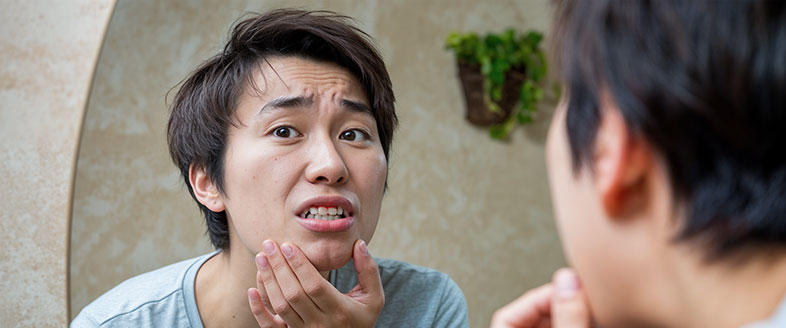You're brushing your teeth in your bathroom and everything seems normal, until you notice a pinkish tint in the toothpaste foam or a slight taste of blood. Moments like these might leave you wondering—should you be concerned if your gums bleed when brushing your teeth?
Before you panic, bleeding gums can happen for several reasons. In this article, we’ll explore the cause of bleeding gums, when to be concerned, and the steps you can take to maintain optimal oral health.
Should You Worry If Your Gums Bleed When Brushing Teeth?
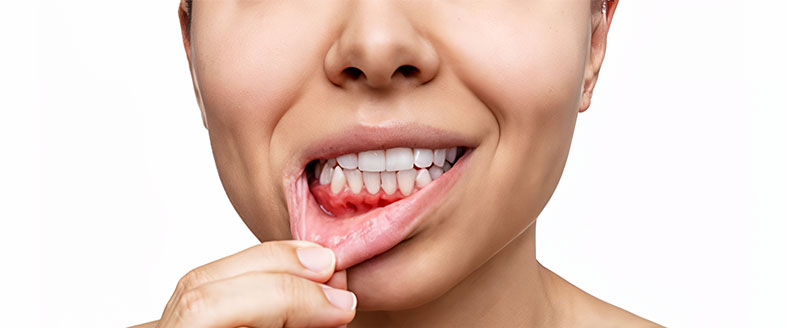
The sight of blood will always be unsettling, but not all instances of gum bleeding are cause for concern. There are a few possible reasons for bleeding gums. They include:
1. Brushing too hard or using a hard-bristled toothbrush
Overzealous brushing or using a toothbrush with bristles that are too stiff can damage your gums and lead to bleeding gums. In fact, hard bristles and rough brushing can cause receding gums and even wear down your tooth enamel. This may lead to tooth sensitivity and other problems down the road. Switching to a soft toothbrush and being gentler on your teeth and gums can prevent bleeding gums and other oral complications.
2. Ill-fitting dentures or dental appliances
Dental appliances, such as dentures and retainers, should fit comfortably without causing excessive pressure or friction. However, sometimes they may not fit as intended. When this occurs, they can create small abrasions or points of irritation that, if left unaddressed, may lead to inflamed or bleeding gums. Typically, this type of bleeding is localised to the affected area and can often be resolved by adjusting the fit.
3. Vitamin C or K deficiency
Vitamin C is a powerful antioxidant that plays a key role in maintaining healthy gum tissue and promoting the repair of damaged tissue. A lack of this vitamin can weaken gum tissue and increase your risk of irritation, gum inflammation, and bleeding.
Vitamin K, on the other hand, is essential for blood clotting. It works by activating proteins involved in the coagulation process to prevent excessive bleeding. If your body lacks vitamin K, it loses its ability to clot blood effectively, leading to more frequent or pronounced bleeding gums even with minimal irritation.
When bleeding gums caused by a vitamin deficiency can be concerning, it’s not a severe issue to be worried about. It simply means that your body requires more nutritional support, and you should be consuming more fruits and vegetables high in these nutrients. For example, oranges, kiwi, broccoli, spinach, and kale.
4. Gum disease
In some cases, bleeding gums can indicate gum disease, also known as periodontal disease. It is an infection of the tissues that hold your teeth in place and is usually caused by poor oral hygiene, which leads to plaque buildup.
When plaque—a sticky film of bacteria that forms on your teeth—accumulates along the gumline, it can irritate the gums and cause inflammation and bleeding. Gums that bleed as a result of gum disease should be checked and treated to prevent potentially irreversible oral health complications.
What Are the Stages of Gum Disease?
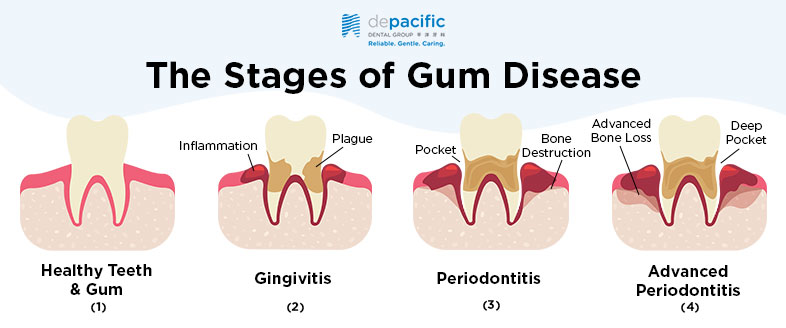
Gingivitis | Gingivitis is the earliest stage of gum disease, and it is characterised by inflammation of the gums. Some of its common symptoms include:The good news is, gingivitis is reversible. With proper oral hygiene, professional dental cleaning, and regular brushing and flossing, you can restore gum health. |
|---|---|
Periodontitis | If gingivitis is left untreated, it can progress to periodontitis, a severe gum disease that affects not just the gums, but also the structures that support the teeth. For instance, your jaw bone. The symptoms of periodontitis include: Unlike gingivitis, periodontitis causes permanent damage to the gums and bone. The infection can create pockets between the gums and teeth for bacteria to thrive, worsening the infection and leading to further tissue and bone loss. Periodontitis must be addressed promptly to prevent serious complications. It can even cause systemic health issues like cardiovascular disease, diabetes, and even respiratory problems. |
5. Underlying medical conditions
Bleeding gums can also be attributed to other issues, such as underlying health conditions like leukaemia, medications, and pregnancy.
Leukaemia
Leukaemia, a type of blood cancer, affects the body’s ability to produce healthy blood cells, including the platelets responsible for clotting. Low levels of platelets may cause the gums to bleed more easily, even during gentle brushing or flossing. While bleeding gums is rare in leukaemia patients and typically accompanied by other symptoms, it’s important to be aware of this possibility.
Pregnancy
Hormonal changes in pregnant women can also cause the gums to bleed during tooth brushing. Pregnancy triggers a range of changes in the body, including increased blood flow and hormone fluctuations. These can result in gum sensitivity and increase one’s risk of swelling, leading to a condition known as pregnancy gingivitis.
For this reason, pregnant women may experience bleeding gums more frequently when brushing or flossing. While this can be uncomfortable, it’s usually not alarming. Such issues should be resolved on their own post-childbirth.
Medications
People on medications, such as blood thinners like aspirin or warfarin are at increased risk of bleeding gums too. These medications are prescribed to prevent blood clots from forming, which can make your gums more prone to bleeding. While generally harmless, this type of bleeding may require medical attention if it becomes excessive or is accompanied by other signs of bleeding.
When Is Gum Bleeding Considered Severe?
Occasional bleeding while brushing or flossing is usually harmless. However, persistent or heavy bleeding may signal gum disease. Understanding when bleeding is serious is crucial for maintaining oral health and preventing further issues.
Gum bleeding is considered severe when it:
If you notice any of these signs, your bleeding gums may not be due to simple irritation but rather, a more serious condition.
If you're unsure about your dental health or concerned about bleeding gums, we encourage you to reach out to us at dePacific Dental.
Our affordable and reliable dental clinics are available islandwide at Ang Mo Kio, Pasir Ris, Balestier, Jurong West, and Novena.
What Should You Do If Your Gums Bleed When Brushing?
Home-based Prevention
1. Brush Gently
Some of you may be brushing your teeth daily, but the technique you’re using may not be effective at cleaning and protecting your oral cavity.
Here’s how to properly brush your teeth:
This not only helps prevent gum damage, but also ensures effective plaque removal. Be sure to replace your toothbrush every three to four months or sooner if the bristles become frayed.
2. Floss Every Day
Flossing is an essential step of daily oral care. It helps remove plaque to prevent gum irritation and reduce your risk of gum disease.
If you experience bleeding gums when flossing, it could be due to infrequent flossing, which prevents your gums from adapting to regular stimulation, or because you’re flossing too hard. With consistent, gentle flossing, your gums will get used to the stimulation and become healthier over time.
Here’s how to floss your teeth:
Learn More: 5 Best Practices for Healthy Gum & Teeth
In-Clinic Treatments & Diagnosis
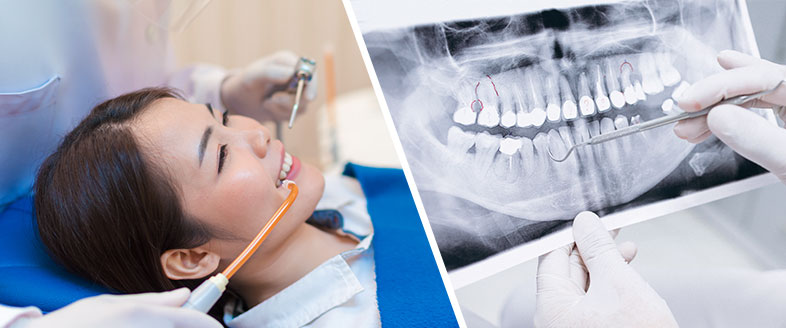
If your gums continue to bleed despite following good oral hygiene practices, it's time to visit your dentist for a comprehensive evaluation.
1. Regular Scaling and Polishing
Professional dental cleanings help remove plaque and tartar buildup that home care cannot reach. Dentists recommend scaling and polishing at least every six months or as advised for individual needs.
2. Dental X-Rays
Dental X-rays can help identify underlying problems like bone loss or deep pockets between the teeth and gums, which are indicative of periodontitis.
Are Your Gums Bleeding? Let Our Dental Professionals Take A Look
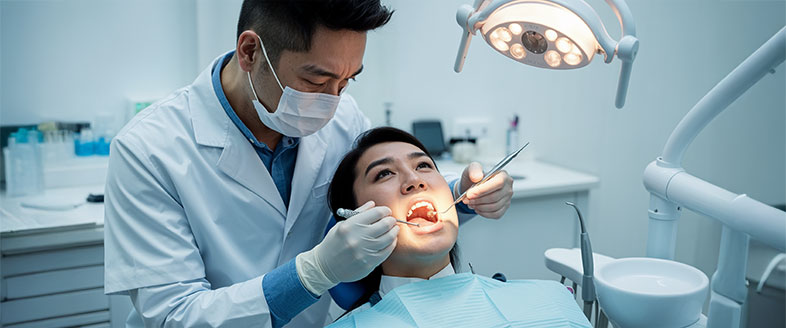
Bleeding gums shouldn’t be ignored, but there’s no need to jump to conclusions.
While proper hygiene practices can help in many cases, persistent or severe symptoms should be evaluated by a dental professional. Self-diagnosing can lead to unnecessary worry or missed treatment opportunities, so it’s always best to consult your dentist.
At dePacific Dental, we’re committed to a caring and gentle approach to dentistry. Let our dental professionals help keep your gums and teeth healthy with personalised care. Reach out to us today and ensure your dental health is in the best hands.

